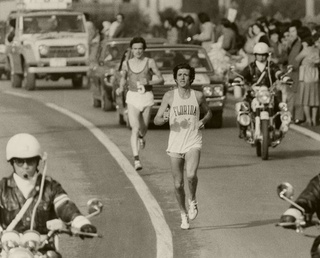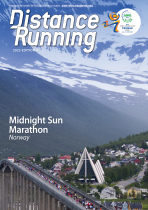Running into history Fukuoka International Marathon
19 October 2016, 7am UTC
The Japanese “Open”
Amid the gloom and social upheaval of post-war Japan, at 09.50 on 7 December 1947, 33 runners began a race in Kumamoto City.
Shizo Kanaguri gave the starting signal. This was the Kanaguri Prize Asahi Marathon, the first forebear of the Fukuoka International Open Marathon Championship which celebrates its 70th edition on 4 December 2016.
Kumamoto is the birthplace of Shizo Kanaguri, the “Father of the Japanese marathon”. Kanaguri was the first Japanese Olympic athlete, competing in the Stockholm Olympic Games of 1912. The aim of inaugurating the race was to honour Kanaguri’s achievements.
In reality, the hidden aims of holding the race were to bring good news through sport to the Japanese people, who were suffering post-war turmoil and depressed morale, and to reinstate the reputation of Japanese marathon running in the international sporting world. The Asahi Shimbun (Japanese Newspaper Company) and the executive members of the Japanese Amateur Athletic Federation (JAAF) organised the race.
On 3 October 1947 the Asahi Shimbun carried an official announcement: “We invite participation from all quarters, so that this race will be the springboard for the coming Olympic marathon and the foundation for resurrecting the marathon in Japan.”
After the second race, new host cities were named, and Takamatsu, Shizuoka, Hiroshima, Fukuoka, Ube, Nagoya, Kamakura, Utsunomiya and Tokyo each served as subsequent race venues. The marathon played an important role in the spread of the sport throughout Japan. Beginning with the eighth race, foreign athletes were invited to participate, in order to make the race an international event. The marathon has been held in Fukuoka every year since the 18th race.
In the early years of the race Japan was still suffering from food shortages. Some athletes brought their own rice because they could not eat enough to run the race using the meal vouchers they received for it. Despite such hardship the races during that time were highly competitive and provided the public with spectacle and excitement. Race records were regularly broken. In 1950 three of the top ten times recorded in the world that year were set in the race.
At the 1964 Tokyo General Assembly of the International Amateur Athletics Federation (IAAF) the Managing Director of the JAAF put forward a proposal to hold a world championship marathon race. The decision was postponed, but after several twists and turns, a race in Japan was finally approved as the International Open Marathon Championship.
The 20th race, held in 1966, was the world’s first marathon to receive support from the IAAF. The name of the event was changed to the “International Open Marathon Championship”. Since 1974, the title of the race has been prefixed with “Fukuoka”; today, the race is officially known as the Fukuoka International Open Marathon Championship.
Two world records have been set in Fukuoka. Derek Clayton (AUS) was the first to break the barrier of 2 hours and 10 minutes by winning the 21st race, held in 1967, with a startling new world record of 2:09:36.4. In 1981 another Australian, Rob de Castella, broke the then world record in the 35th race with a time of 2:08:18 seconds. The current course record of 2:05:18 was set by Tsegaye Kebede (KEN) in the 63rd race, held in 2009.
Frank Shorter (USA) achieved the great feat of four consecutive victories beginning with the 25th race. Toshihiko Seko (JPN), who also won the Boston, London and Chicago Marathons, holds a total of four championship titles, including three consecutive victories. Atsushi Fujita (JPN) won the 54th race by setting the then-Japanese record time of 2:06:51 seconds. In the 60th race, held in 2006, Haile Gebrselassie (ETH) triumphed. Last year the race featured many outstanding names including world record holder Dennis Kimetto and former world record holder Patrick Makau (KEN).
The Fukuoka International Open Marathon Championship, which has seen many memorable races involving Japanese and overseas runners over the years, has been awarded an IAAF “gold label”. The organisers hope the race will continue to serve as a dignified sporting event and continue to lead the way in the world of international Marathon running.
Fukuoka’s Hakata Station features a marathon monument at which the cast footprints of past winners are on display.






